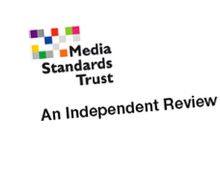
In an interview on this morning's BBC Radio 4 Today Programme, PCC chair, Sir Christopher Meyer, accused the Media Standards Trust (MST) of failing to contact his organisation with its concerns and said that the report findings included 'statistics of the madhouse'.
In the same interview Sir David Bell, chair of the MST said the PCC would be consulted during the second stage of the 'A More Accountable Press' report. The first part is entitled 'The Need for Reform - is self-regulation failing the press and public?'
While Bell did not claim the PCC had been consulted, he said Meyer was 'wrong on almost every count'.
"We [MST] are more expert on their website than they [PCC] are themselves," he said.
Martin Moore, who spoke to Journalism.co.uk after the broadcast, said Meyer's comment about consultation was 'wrong', but Bell had not denied it during the broadcast because he had not been involved in the process himself.
"We spoke to the director; we spoke to the deputy director. Last summer we made a public call to the PCC to do its own review of self-regulation and it got ignored," Moore said.
"[MST] spoke to the PCC about some of issues we address: [we said] 'you realise we are going to making criticisms'," Moore said.
Toulmin told Journalism.co.uk he had met Moore, but had no idea about the research until an embargoed copy report was couriered to the PCC on Friday afternoon.
"I'm astonished, that's completely untrue," Toulmin said, in response to Moore's comments.
"We've spoken, but not on the basis of them doing an inquiry," he said, adding that he had not been given a 'fair opportunity' to 'rebut allegations' made in the report, which 'is damaging and lacking any sort of intellectual rigour'.
"I honestly can't remember," Toulmin said, in regards to the call for review. There are all sorts of people who say things about the press and the PCC, but we don't necessarily recognise their standing. Just because they tell us to do something doesn't mean we should necessarily jump to it."
He did however concede there were 'one or two reasonable points' which were lost in the report's 'lack of balance': "These are people who made up their minds about something and let it descend into a rant."
The PCC is looking into ways to address digital publishing, Toulmin added, with the new PCC chairman expected to bring further change.
But it would be impossible to alter the PCC as suggested by the report, which emphasises the need for reform of press self-regulation, without changing the entire nature of the body, he said.
"[The MST] disagree with that structure - that there should be industry involvement in it - so therefore we can't accept that there can be any substantive basis for reform on that, because that's the whole rationale for the system; the system we think works."
Media commentators were also divided by the report: Peter Wilby defended it in the Guardian, but POLIS director, Charlie Beckett, condemned parts of the report in a blog post.
In the Independent, Stephen Glover analysed the downside of losing the PCC as a regulatory body, while Martin Moore discussed the report and its findings on his own MST blog.
The director of the Society of Editors, Bob Satchwell, has also criticised the report. "It is usual practice to put such strong allegations to those criticised before publishing. It is perhaps fortunate for the MST that they do not come under the ambit of the PCC. If it did this report would fall at the first clause of the Editors' Code of Practice concerning accuracy because it fails to distinguish between comment, conjecture and fact," Satchwell said, in a release from the Society of Editors.
"While the PCC system can always be improved, the MST report is far off the mark. I understand they did not consult the PCC, neither did they consult the Society of Editors," Satchwell added.
Update 18/02/09: References to 'consult' or 'consultation' have been removed or changed to 'contact', to make it clear that Moore claimed he spoke, rather than officially consulted the PCC, and that Toulmin did not consider this to be an appropriate level of contact, when Moore's comments were put to him.
Free daily newsletter
If you like our news and feature articles, you can sign up to receive our free daily (Mon-Fri) email newsletter (mobile friendly).
Related articles
- #JournalismMatters: The challenges of journalism in exile
- What to do if you are threatened with a SLAPP lawsuit
- WAN-IFRA: Five challenges to press freedom
- Economics woes affecting UK press freedom, RSF World Press Freedom Index finds
- Predictions for journalism 2024: misinformation, online safety and press freedom









